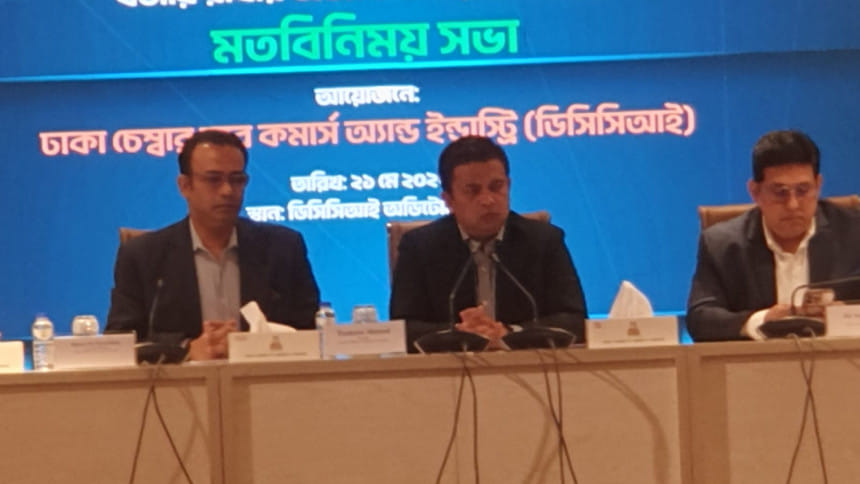Extortion remains rampant, threatens business confidence

Extortion continues to be a widespread problem for businesses across the country although eight months have passed since the fall of the previous authoritarian regime, business leaders said yesterday.
"Extortion has become an abscess for businesses. Even now, businesspeople cannot operate without fear," said Taskeen Ahmed, president of the Dhaka Chamber of Commerce and Industry (DCCI).
He made the remarks while delivering the opening speech at a discussion titled "Importance of Maintaining Improved Law and Order for Easing Trade and Commerce", held at the DCCI auditorium in Motijheel yesterday.
Ahmed urged the government to ensure a truly investment-friendly environment where enterprises can operate smoothly, transparently, and securely, and called for coordinated policy actions that address law and order challenges directly.
"In this situation, a clear and reasonable expectation from the business community is that they will be allowed to conduct business without fear," he said.
"At this moment, our top priority must be to adopt a coordinated policy framework and take decisive action, especially focusing on business-related law-and-order issues."
"Extortion has become an abscess for businesses. Even now, businesspeople cannot operate without fear," said DCCI President Taskeen Ahmed
He stressed the importance of building mutual trust and cooperation among the business community, law enforcement agencies, and city administrations.
"Without a secure and predictable environment, investor confidence cannot be ensured," he added.
Despite the change in regime, Ahmed noted, the law-and-order situation has yet to improve to the expected level. "Businesses are still worried. Extortion remains a serious threat to day-to-day operations."
Highlighting further obstacles, the DCCI president pointed to challenges such as online fraud, threats to the transportation of goods, counterfeiting, and cybercrime, all of which are undermining investor confidence.
He also drew attention to a disparity in law enforcement response times. "While the authorities act quickly in the garment sector, small and medium-sized enterprises employing 50 to 100 people are often ignored," he observed.
Recalling expectations following last year's regime change, Taskeen said many had hoped for improved governance and stronger law enforcement. "Unfortunately, the opposite has happened. In a country like Bangladesh, ensuring law and order is fundamental for any kind of socioeconomic progress."
He reiterated that Bangladesh is at a crucial juncture as it moves towards industrialisation, digital transformation, export diversification, and domestic market expansion.
"To sustain this momentum, a secure, stable, and efficient law enforcement environment is absolutely essential."
Abdus Salam, former DCCI vice-president, said the hopes for regime transition improvements have not materialised. "Instead, conditions are worsening."
Another former DCCI vice-president, M Abu Huraira, warned that the continued decline in law enforcement could render business operations unsustainable.
He also proposed moving electric battery-powered rickshaws outside the city and demanded urgent implementation of a strategic transport plan for Dhaka.
Md Golam Mawla, president of the Edible Oil Traders' Association, criticised the broker-dominated truck rental system at land ports, which inflates transport costs by Tk 8,000–10,000 per trip.
Abul Hashem, president of the Sugar Traders' Association, said fear of robbery now keeps traders indoors at night, citing instances of sugar trucks being hijacked.
Lutfur Rahman Babu, president of the Mohammadpur Town Hall Kitchen Market Traders' Association, said criminal activities and extortion in Mohammadpur continue unchecked. "Businesses want a way out of this chaos," he said.
He alleged that the law-and-order situation in Mohammadpur is deteriorating, and no effective measures from the law enforcement agencies are visible.
Mohammad Nazrul Islam, president of the Dhamrai Brick Kiln Owners' Association, echoed similar concerns, adding that extortion has become unbearable.
A representative of the Stationery Traders' Association in Chawkbazar raised concerns about accessibility issues in Moulvibazar due to illegal parking and blocked roads.
Inspector (Investigation) of Motijheel Police Station, Md Mahaymenul Islam, said that the law-and-order situation has improved since August 5, but further improvement is still needed.
He agreed that a fully conducive law-and-order environment for commercial activities has yet to be ensured.
He mentioned that relevant agencies are trying to establish a friendly atmosphere and that the police cannot succeed without public cooperation.
He also stated that the police have always taken a tough stance against youth gangs and will continue to do so in the future.
Several traders alleged that a few companies have monopolised the edible oil and sugar markets, which worsened after S Alam Group halted operations. They demanded liberalised imports to stabilise prices.
"Instead of dismantling syndicates, the number of sugar importers has dropped from five to three," said Ahmed. "We must liberalise sugar imports."
Speakers also called for urgent regulation of battery-run rickshaws, which they said disrupt traffic and contribute to disorder in commercial areas.

 For all latest news, follow The Daily Star's Google News channel.
For all latest news, follow The Daily Star's Google News channel. 



Comments